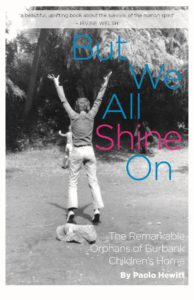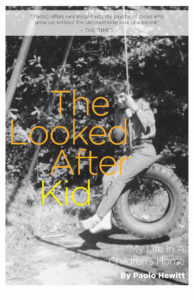 Paolo Hewitt, author of But We All Shine On and The Looked After Kid, was in Woking last week, the town of the children’s home in which he grew up, to give a talk about his experience in care, and how his personal journey as an adult to discover whatever happened to his close childhood friends led him to write these two, highly moving and inspirational books.
Paolo Hewitt, author of But We All Shine On and The Looked After Kid, was in Woking last week, the town of the children’s home in which he grew up, to give a talk about his experience in care, and how his personal journey as an adult to discover whatever happened to his close childhood friends led him to write these two, highly moving and inspirational books.
As soon as I walked into the room the nerves kicked in. I had been fine up until that point but the sight of maybe 100 people ready to hear me read and talk about my time in care switched the dial.
It was then I recalled some advice given to me many years ago before a similar event. I was told there was no reason to be nervous. People who were there to hear me read were on my side. They were not against me, they were for me; they wanted to see me succeed. The crowd was not hostile; they were onside. So why be afraid?
I passed this very advice onto Colin Christensen who helped organise the conference last week. He came to London one day with Sharon who worked at Burbank, my old children’s home, and asked me if I could be there. They bought me pizza, he pretended to like my team Spurs, and I pretended to mull over their offer.
Don’t tell anyone but the truth is I never refuse any request to do with care. I was in before he even got to London.
Thus on May 17th I rolled into Woking, the sight and sound of my teenage years.
I had decided to read two sections from my book But We All Shine On – The Remarkable Orphans Of Burbank Children’s Home. I have published over 20 books but if push came to shove I would nominate this as my numero uno, closely followed by its predecessor, The Looked After Kid.
I would do so because not only do I think it demanded and produced my very best but also because I was very fortunate. In the book I track down four of the guys I shared my children’s home with back in the 70s and all four of them had unique characteristics which, in turn, gave the book a unique colour and a great depth.
Prior to entering care, Des Hurrion was a sensitive soul who played the piano and read voraciously. He knew that in care such leanings would not be widespread. So to adapt and survive he created a character to get him through. As I write in the book: ‘Charm and humour would be his protection from the fists of the unhappy.’
David Westbrook was an unhappy child seeking attention. So much so that at Burbank he would regularly take the blame for all kinds of things. A bicycle goes missing- “That was me, sir”. Money is stolen from the office- “That was me, sir”. It wasn’t but he just needed validation of his existence at Burbank. His desire to be noticed drew him into prison.
Norman Bass spent his time running away as much as he could from Burbank and no one stopped to think that, as he had a bad stutter and the kids at school laughed at him from eight o’ clock in the morning til sundown, that this might just be the cause for his regular excursions into the British countryside. For on his own he did not have to talk to anyone.
And Terry Hodgson – God bless him – led a life filled with crime and drugs and chaos and mayhem and then one day in prison God entered his soul and turned him round.
Four distinct characters with four distinct stories and, better still, they were all in very good places when I spoke to them.
Thus the title But We All Shine On courtesy of one John Winston Ono Lennon.
I read two sections at the conference. One pertained to Des and his vivid experience of what I call The Orphan’s Epiphany, the moment I believe happens to all of us who have been abandoned, the moment we know for certain that we are completely alone in the world.
 The second section recounted my visiting Burbank with Des at a later date and how I came to see how much Burbank had given me in terms of strength and courage, how I had learnt so much there about loyalty and friendship, how Burbank had helped shape me for the better.
The second section recounted my visiting Burbank with Des at a later date and how I came to see how much Burbank had given me in terms of strength and courage, how I had learnt so much there about loyalty and friendship, how Burbank had helped shape me for the better.
The common belief that a children’s home is a gloomy institution is wrong. Care is a multi – dimensional experience. As I write in the book, ‘Yes some days were awful. But weren’t some of yours?’
I think my crusade, if I have one, is twofold. In writing these books I have sought to change the perception of care, to put forward a different narrative. I have also looked to produce works that would have inspired me as a young boy in care.
The compliments that touch me the deepest are from those who have travelled through the care system and tell me how much my books mean to them. There is no higher compliment.
After I had finished reading at the conference, many people approached me. Two in particular stuck out. One was a young Pakistani woman. ‘Thank you,’ she said, ‘I did not grow up in care but you have inspired me to write my own book now, the story of an immigrant woman.’
The second woman worked in the care system. ‘You know of late I have been tired and jaded but your words have inspired me to do so much better now. Thank you.’
I admit to the following; when I wrote my books part of my fantasy was that they would sell millions. Then, I would be able to buy an island somewhere and retire on the proceedings.
But words such as those – priceless.
To find out more about Paolo’s books, click here
A memory of you Paulo has always stuck with me. I visited Burbank after School one day back in 1972 as I was invited by John O’Reily whom I had built a friendship with at SJB, and who was also a resident in Burbank. You were sitting on your own eating your tea, when We saw each other and said hello. Obviously we had observed each other previously at School, but my visit to Burbank was the realisation that you were also a resident their. So pleased you have had some success with your life, and hope John did also, but we lost touch many years ago. It’s good to know that you are also a fellow Spurs supporter, as I have been for 50 years. Might catch you at The New Lane next year. Good times are ahead. Alll the Best John Hulse.